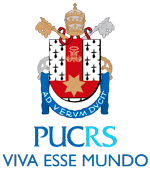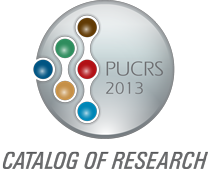Foreword
Research Structures
Energy, Environment, and Biodiversity
- Metallic Materials Engineering
- Solar Energy
- Biodiversity and Ecosystems in Fields and Forests of the Atlantic Forest
- Economic, Human, and Environmental Development
- Primatology
- Genetics, Evolution, Ecology, and Conservation of Carnivores
- Oleochemistry: Processes and Products
- Technologies to Mitigate Environmental Impacts
- Ichthyology
- Ornithology
- The Center for Wind Energy
Humanities and Ethics
- Fundamental Rights
- Theological and Ethical Anthropology
- The Political Authoritarianism and Press in Contemporary Brazil
- Christology within the Contemporary Latin American Context
- Law and Bioethics
- Clinical Bioethics
- Ecclesiology and Emergent Problems
- Analytic Epistemology
- Ethics, Contemporaneity, and Deconstruction: The Philosophical Criticism of Violence
- Immigration, Towns, and Foreigners Narratives of Brazil (1864–1964)
- Criminal Procedure and Democratic Rule of Law
Culture and Education
- Southern Writers Collection
- Architecture and Heritage
- Culture, Subjectivity, and Formative Policies
- Between the Memories and Stories of Schools at Rio Grande do Sul: From the Deutscher Hilfsverein to Farroupilha School (1858-2008)
- Enunciation and Discourse
- Education for Health and Inclusive Education
- Teaching of Physics
- Format Y: Formation in Mathematics for Generation Y
- History of Literature: The Investigation and Diffusion of Sources
- Reading Literature: The School and Other Social Agencies
- Chemical Education
- Relationship between the Nature of Science and Science Education
- Literature, History, and Theories on the Imaginary
- Training of Professors, Licentiates, and Pedagogical Practices
Society and Development
- Companies and Organizations
- Law and Economy
- Study and Research on Violence
- Family, Social Work, and Health
- Architecture and Industrialization
- Agribusiness
- Social Well-being Economics
- Applied Mathematics
- Class Action Lawsuits
- Psychology and Social Policies: Memory, History, and Production of the Present Time
- Inter-organizational Relationships and Systemic Competitiveness
- Parties, Elections, and Political Communication
- Fundamental Principles of Tax Law
- Social Demands and Policies
Information and Communication Technology
- Wireless, Wired, and Optic Communications
- Organizational Communication
- Strategy and Innovation
- Hardware Project Support
- Computing Molecular Biophysics – The Modeling and Simulation of Biosystems
- Technological Development in Telehealth
- Resource Management and Virtualization
- The Management and Governance of Information Technology
- International News at the Global Village
- Communication Science
- Ubiquity and Technological Convergences in Communication
- Aerospace Research
- The Performance Evaluation Group
- The Group on Systems, Signals, and Computing
Biology and Health
- Cancer and Other Pathologies of the Oral and Maxillofacial Region
- Memory
- Molecular and Functional Biology
- Cardiometabolic Risk, Aging, and Nutrition
- Health Education and Work
- Structural Biochemistry
- Pediatric Respirology
- Applied Pharmacology: Characterization of Mechanisms Involved in Pain, Inflammation and Cancer
- Immunology and Immunodiagnostics
- Nephrology
- Neurosciences
- Orthodontics
- The Promotion of Health in Longevity
- Olympic Studies and Health Sciences
- Nerve Regeneration
- Intensive Neonatal Medicine and Congenital Infections
- Aerospace Pharmacy
- Medical Imaging
- Pulmonology
- Orofacial Pain and Temporomandibular Disorders
- Metabolic Transformations of Purines of Biological Importance
- The Study of Parasitosis, Biochemical Parameters, and Hematological Parameters Associated with Aging
- Aerospace Science
- Bioethics and Ethics Applied to Animals
- Pharmacovigilance
- Evaluation and Intervention in the Life Cycle
- Surgery for Obesity and Metabolic Syndrome
- Modification of Lifestyle and Cardiovascular Risk
- Nanostructures and Nanoscopy
- Clinical and Experimental Neuropsychology
- Psychology of Occupational Health
- Memory and Neurodegeneration
- Epidemiology, Neurology, and Immunology
- Chemistry of Natural Products
- Health Economics
Research Structures and Researchers
- RESEARCH STRUCTURES AND RESEARCHERS
- Business School: Management, Accounting and Economics (FACE)
- School of Architecture and Urbanism (FAU)
- School of Biosciences (FABIO)
- School of Aeronautical Sciences (FACA)
- School of Social Communication (FAMECOS)
- Law School (FADIR)
- School of Education (FACED)
- School of Physical Education and Sport Science (FEFID)
- School of Nursing, Nutrition and Physiotherapy (FAENFI)
- School of Engineering (FENG)
- School of Pharmacy (FFARM)
- School of Philosophy and Human Sciences (FFCH)
- School of Physics (FAFIS)
- School of Computer Science (FACIN)
- School of Letters: Languages, Linguistics and Literature (FALE)
- School of Mathematics (FAMAT)
- School of Medicine (FAMED)
- School of Dentistry (FO)
- School of Psychology (FAPSI)
- School of Chemistry (FAQUI)
- School of Social Work (FSS)
- School of Theology (FATEO)
- Institute of Bioethics (IB)
- Institute of Geriatrics and Gerontology (IGG)
- Institute of Research and Development (IDÉIA)
- Institute of Biomedical Research (IPB)
- Institute of Toxicology and Pharmacology (INTOX)
- Institute of the Brain (InsCer)
- Institute of Environment and Natural Resources (IMA)
- Museum of Sciences and Technology (MCT)
Juvenile readers at the center of attention
An ambitious project that emphasizes emerging fields of study in Brazil is a priority of the Reading Literature Research Group: The School and Other Social Agencies, chaired by Professor Vera Teixeira de Aguiar. Titled Interstices: juvenile literature and the formation of readers – art and cultural industry, in 2012, this project completes a four-year cycle devoted to studies on the national literature production targeting the juvenile readership since the 1970s. Sponsored by the National Program of Academic Cooperation (Procad/Capes), the project is chaired by PUCRS and involves São Paulo State University at Assis (UNESP-Assis), the State University of Maringá (UEM), and Federal University of Goiás (UFG).
The goals of this project include the performance of a critical analysis of the target works to construct a historical panorama of such production and formulate a theory of this genre and teaching methods focused on juvenile readers. Based on the investigated titles, a database was established listing subject headings, authors, data, place of publication, and structural features of the narratives. This online tool is available at http:// literaturajuvenilempauta.com.br/ and will allow searches based on different criteria.
Partial results include books, such as Heroes against the wall – studies on children and juvenile literature in 2010 and Told and retold: from sources to invention in 2012. In addition, the results include articles, essays, and master’s and doctoral dissertations on this subject. The studies continue within the context of the Brazilian juvenile literature: constitution of the object and its narrative modalities project, which aims to establish a typology of such literature to create computer-supported reading itineraries.
Another project devoted to qualifying the process of reading is entitled Dionélio Machado Speaks and consists of an e-book comprising interviews conducted with Dionélio Machado related to several links. Navigation across the website allows access to other materials organized in sections (the man, the journalist, the writer, the politician, and the doctor) that cast light on one of the most expressive intellectuals of Rio Grande do Sul state.




